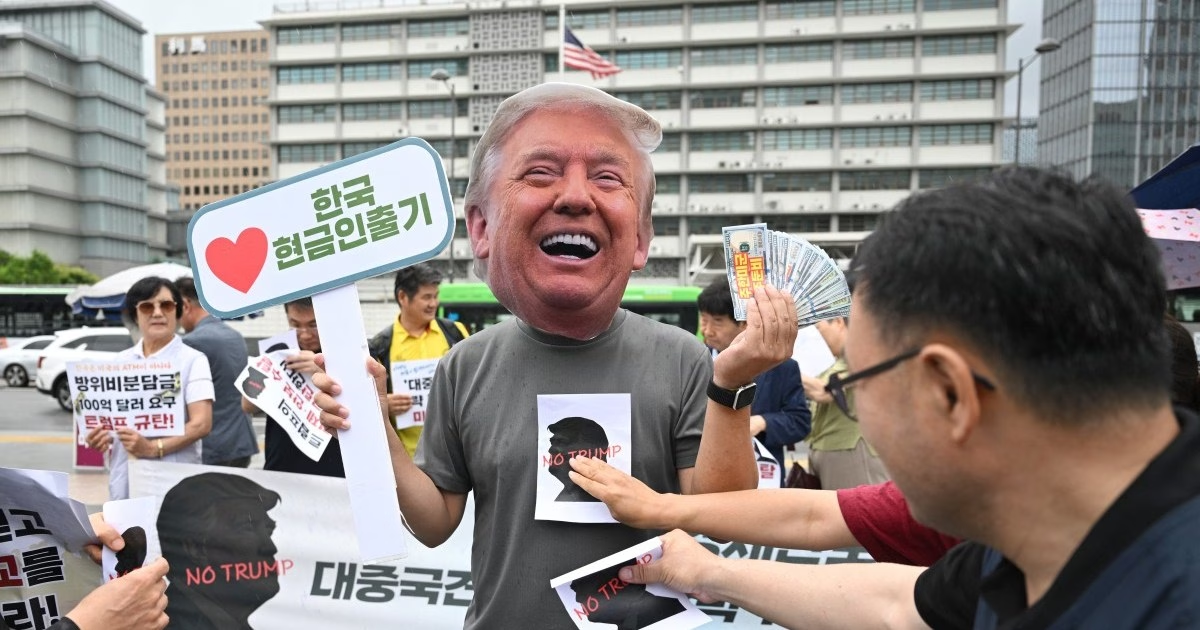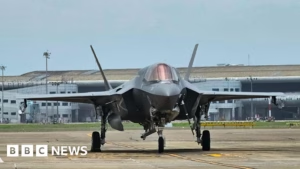Seoul, South Korea – When Sideny Sim had the opportunity to visit the United States on business several years ago, it was the realization of a lifelong aspiration.
Like many South Koreans, Sim had long-held admiration for the US as a cultural powerhouse and a positive influence globally.
Nowadays, Sim, a 38-year-old engineer residing near Seoul, harbors no such affection towards the country.
With US President Donald Trump’s threat of imposing a 25% tariff on South Korea starting from August 1, Sim feels a deep sense of betrayal.
“If the US was once respected as a leader in culture, economics, and maintaining a ‘good’ global image, I now perceive it as a threat to geopolitical stability,” Sim stated to Al Jazeera.
South Korea and the US share profound and enduring relations.
South Korea is one of Washington’s closest allies in Asia, accommodating approximately 28,000 US troops as a bulwark against North Korea.
The US is home to the largest South Korean diaspora in the world.
However, with the resurgence of Trump’s “America First” agenda in Washington, DC, those ties are facing strain.
A recent Pew Research Center survey revealed that 61% of South Koreans hold a favorable view of the US, a decline from 77% in 2024.
Like many other US trading partners, South Korea is facing significant economic disruption if it fails to secure a trade deal with the Trump administration by the August deadline.
As a major exporter of electronics, ships, and cars, South Korea generates over 40% of its gross domestic product (GDP) through exports.
Along with sending a letter to South Korean President Lee Jae-Myung detailing his tariff threats, Trump also recently claimed that Seoul pays “very little” to support the presence of US Forces Korea (USFK).
Trump’s comments fueled speculation that he may demand South Korea to increase its national defense spending or contributions to USFK costs.
Following Trump’s statement that South Korea “wants to make a deal right now,” Seoul’s top trade envoy indicated that an “in-principle” agreement might be achievable by the deadline.
The uncertainty sparked by Trump’s trade policies has ignited resentment among many South Koreans.
Kim Hyunju, a customer service agent in Seoul, noted that while her company would not be directly hit by the tariffs, Trump’s trade maneuvers didn’t seem fair.
“It would only be just if they were okay with us raising our tariffs to the same level as well,” Kim remarked to Al Jazeera, noting that Trump’s actions had caused her to harbor animosity towards the US.
“The US appears to be a powerful nation that pursues its interests with money and power plays,” Kim said, adding, “Though I’ve considered the US as a friendly ally, especially for national defense, my faith wavered when Trump demanded more money for the US military presence here.”

Kim Hyun-ju says Trump’s policies have instilled animosity towards the US [Courtesy of Kim Hyun-ju] Kim Chang-chul, an investment strategist in Seoul, views Trump’s trade policies more positively, despite acknowledging the harm they could cause to South Korean businesses.
“The US tariff policy is a burden on our government and businesses, but it showcases the depth of US decision-making and strategy,” Kim stated to Al Jazeera.
“Trump wants South Korea to engage more in the US’s energy ambitions in Alaska. It’s part of a push for geopolitical realignment and economic rebalancing,” he explained.
Earlier this year, discussions were held between the US and South Korean officials about increasing US exports of liquefied natural gas (LNG) to South Korea, its biggest importer.
Keum Hye-yoon, a researcher at the Korea Institute for International Economic Policy (KIEP), finds it challenging for a US ally like South Korea to make sense of Trump’s statements and actions.
“When Trump refers to ‘fairness’ in his tariff policy, it’s based on unilateral expectations of improving the US trade balance or revitalizing specific industries,” Keum noted to Al Jazeera.
“As allies like South Korea share supply chains with the US and collaborate closely with its companies, ignoring these structures and imposing high taxes will likely burden US businesses and consumers as well,” she said.
Although Trump’s most severe tariffs have yet to take effect, South Korean manufacturers have already reported disruptions.
South Korea’s exports dropped by 2.2% in the first 20 days of July compared to the same period a year earlier, according to preliminary data released by Korea Customs Service.
Kim Sung-hyeok, the head of research at the Korean Confederation of Trade Unions (KCTU) Labour Institute, said the automotive, steel, semiconductor, and pharmaceutical sectors have been particularly affected.
“Since the tariff announcements, exports in these fields have significantly decreased; consequently, production orders in domestic factories have dwindled,” Kim informed Al Jazeera.

Vehicles for export at a port in Pyeongtaek, southwest of Seoul, on July 8, 2025 [Anthony Wallace/AFP] A June estimate from the Korea Development Institute predicted that the number of employed South Koreans would increase by just 90,000 this year, partly due to economic uncertainties, compared to a rise of 160,000 last year.
Even before Trump assumed office, US-South Korea relations had experienced challenging periods.
In 2002, two South Korean middle-school girls were killed when an American armored vehicle struck them.
After American soldiers involved in the incident were absolved of negligent homicide by a US military court, the country witnessed a surge in anti-US sentiment and nationwide protests.
In 2008, widespread protests occurred after the South Korean government decided to resume importing US beef, despite concerns over the risk of Mad Cow Disease.
More recently, President Lee, who took office in June, has stressed the importance of maintaining positive relations with China, Washington’s biggest strategic adversary and competitor.
The KIEP’s Keum stated that the US-South Korea relationship has evolved into a partnership where the US is now a “conditional ally,” prioritizing “economic interests over traditional alliances.”
“The US is increasingly pressing South Korea to cooperate in its strategy to contain China, along with other socio-economic policies,” she explained.
Keum indicated that South Korea will need to seek out alternative markets and diversify its exports to mitigate the fallout from Trump’s agenda.
“South Korea doesn’t need to act alone. The country can seek joint action with countries such as EU members, Japan, and Canada to devise collective responses to the current situation,” she suggested.
Like many South Koreans, Sim had long-held admiration for the US as a cultural powerhouse and a positive influence globally.
Nowadays, Sim, a 38-year-old engineer residing near Seoul, harbors no such affection towards the country.
With US President Donald Trump’s threat of imposing a 25% tariff on South Korea starting from August 1, Sim feels a deep sense of betrayal.
“If the US was once respected as a leader in culture, economics, and maintaining a ‘good’ global image, I now perceive it as a threat to geopolitical stability,” Sim stated to Al Jazeera.
South Korea and the US share profound and enduring relations.
South Korea is one of Washington’s closest allies in Asia, accommodating approximately 28,000 US troops as a bulwark against North Korea.
The US is home to the largest South Korean diaspora in the world.
However, with the resurgence of Trump’s “America First” agenda in Washington, DC, those ties are facing strain.
A recent Pew Research Center survey revealed that 61% of South Koreans hold a favorable view of the US, a decline from 77% in 2024.
Like many other US trading partners, South Korea is facing significant economic disruption if it fails to secure a trade deal with the Trump administration by the August deadline.
As a major exporter of electronics, ships, and cars, South Korea generates over 40% of its gross domestic product (GDP) through exports.
Along with sending a letter to South Korean President Lee Jae-Myung detailing his tariff threats, Trump also recently claimed that Seoul pays “very little” to support the presence of US Forces Korea (USFK).
Trump’s comments fueled speculation that he may demand South Korea to increase its national defense spending or contributions to USFK costs.
Following Trump’s statement that South Korea “wants to make a deal right now,” Seoul’s top trade envoy indicated that an “in-principle” agreement might be achievable by the deadline.
The uncertainty sparked by Trump’s trade policies has ignited resentment among many South Koreans.
Kim Hyunju, a customer service agent in Seoul, noted that while her company would not be directly hit by the tariffs, Trump’s trade maneuvers didn’t seem fair.
“It would only be just if they were okay with us raising our tariffs to the same level as well,” Kim remarked to Al Jazeera, noting that Trump’s actions had caused her to harbor animosity towards the US.
“The US appears to be a powerful nation that pursues its interests with money and power plays,” Kim said, adding, “Though I’ve considered the US as a friendly ally, especially for national defense, my faith wavered when Trump demanded more money for the US military presence here.”

“The US tariff policy is a burden on our government and businesses, but it showcases the depth of US decision-making and strategy,” Kim stated to Al Jazeera.
“Trump wants South Korea to engage more in the US’s energy ambitions in Alaska. It’s part of a push for geopolitical realignment and economic rebalancing,” he explained.
Earlier this year, discussions were held between the US and South Korean officials about increasing US exports of liquefied natural gas (LNG) to South Korea, its biggest importer.
Keum Hye-yoon, a researcher at the Korea Institute for International Economic Policy (KIEP), finds it challenging for a US ally like South Korea to make sense of Trump’s statements and actions.
“When Trump refers to ‘fairness’ in his tariff policy, it’s based on unilateral expectations of improving the US trade balance or revitalizing specific industries,” Keum noted to Al Jazeera.
“As allies like South Korea share supply chains with the US and collaborate closely with its companies, ignoring these structures and imposing high taxes will likely burden US businesses and consumers as well,” she said.
Although Trump’s most severe tariffs have yet to take effect, South Korean manufacturers have already reported disruptions.
South Korea’s exports dropped by 2.2% in the first 20 days of July compared to the same period a year earlier, according to preliminary data released by Korea Customs Service.
Kim Sung-hyeok, the head of research at the Korean Confederation of Trade Unions (KCTU) Labour Institute, said the automotive, steel, semiconductor, and pharmaceutical sectors have been particularly affected.
“Since the tariff announcements, exports in these fields have significantly decreased; consequently, production orders in domestic factories have dwindled,” Kim informed Al Jazeera.

Even before Trump assumed office, US-South Korea relations had experienced challenging periods.
In 2002, two South Korean middle-school girls were killed when an American armored vehicle struck them.
After American soldiers involved in the incident were absolved of negligent homicide by a US military court, the country witnessed a surge in anti-US sentiment and nationwide protests.
In 2008, widespread protests occurred after the South Korean government decided to resume importing US beef, despite concerns over the risk of Mad Cow Disease.
More recently, President Lee, who took office in June, has stressed the importance of maintaining positive relations with China, Washington’s biggest strategic adversary and competitor.
The KIEP’s Keum stated that the US-South Korea relationship has evolved into a partnership where the US is now a “conditional ally,” prioritizing “economic interests over traditional alliances.”
“The US is increasingly pressing South Korea to cooperate in its strategy to contain China, along with other socio-economic policies,” she explained.
Keum indicated that South Korea will need to seek out alternative markets and diversify its exports to mitigate the fallout from Trump’s agenda.
“South Korea doesn’t need to act alone. The country can seek joint action with countries such as EU members, Japan, and Canada to devise collective responses to the current situation,” she suggested.








